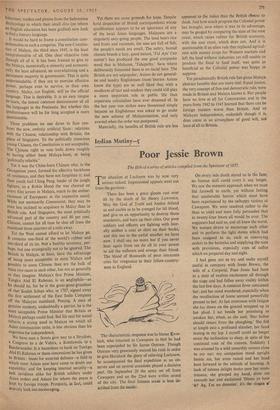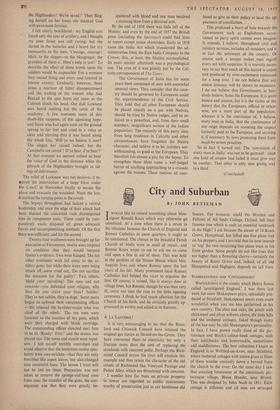Indian Mutiny-5
Poor Jessie Brown
The Nth of a series of articles compiled from the Spectator of 1857.
THE situation at Lucknow was by now very serious indeed. Impassioned appeals went out from the garrison :
There has been a great gloom cast over all by the death of Sir Henry Lawrence. May the God of Truth and Justice defend us and enable us to be avenged for his blood, and give us an opportunity to destroy those murderers, and burn up their cities. Our poor soldiers and officers are fighting with liter- ally neither a coat or shirt on their backs, and this too in the awful weather we have now. I shall say no more but if you never hear again from me do all in your power to aid the sufferers and avenge their blood. The blood of thousands of poor innocents cries for vengeance to their fellow-country- men in England.
The characteristic response was to blame !Cave- lock, who returned to Cawnpore to find he had been superseded by Sir James Outram. Though Outram very generously waived his rank in order to give Havelock the glory of relieving Lucknow, he accompanied the final expedition as an ob- server and on several occasions played a decisive part. On September 20 the army set off from Cawnpore and on the 22nd were within sound of the city. The final famous scene is best de- scribed from the inside: On every side death stared us in the face; no human skill could avert it any longer. We saw the moment approach when we must bid farewell to earth, yet without feeling that unutterable horror which must have been experienced by the unhappy victims at Cawnpore. We were resolved rather to die than to yield and were fully persuaded that in twenty-four hours all would be over. The engineers had said so, and all knew the worst. We women strove to encourage each other and to perform the light duties which had been assigned to us, such as conveying orders to the batteries and supplying the men with provisions, especially cups of coffee which we prepared day and night.
I had gone out to try and make myself useful in company with Jessie Brown, the wife of a Corporal. Poor Jessie had been in a state of restless excitement all through the siege and had fallen away visibly Within the last few days. A constant fever consumed her; and her mind wandered, especially when the recollection of home seemed powerfully present to her. At last overcome with fatigue she lay down on the ground wrapped up in her plaid. I sat beside her promising to awaken her, when, as she said, 'Her father should return from the ploughing.' She fell at length into a profound slumber, her head resting in my lap. I myself could no longer resist the inclination to sleep, in spite of the continual roar of the cannon. Suddenly I was aroused by a wild unearthly scream close to my ear; my companion stood upright beside me, her arms raised and her head bent forward in the attitude of listening. A look of intense delight broke over her coun- tenance, she grasped my hand, drew me towards her and exclaimed 'Dinna ye hear 'it? Ay, I'm no dreamin', it's the slogan o' the Highlanders! We're saved !' Then fling- ing herself on her knees she thanked God with passionate fervour.
I felt utterly bewildered : my English ears heard only the roar of artillery, and I thought my poor Jessie was still raving; but she darted to the batteries and I heard her cry incessantly to the men, 'Courage, courage !
Hark to the slogan—to the Macgregor, the grandest of them a'. Here's help at last !' To describe the effect of these words upon the soldiers would be impossible. For a moment they ceased firing and every soul listened in intense anxiety. Gradually, however, there arose a murmur of bitter disappointment and the wailing of the women who had flocked to the spot burst out anew as the Colonel shook his head. Our dull Lowland ears heard nothing but the rattle of the musketry. A few moments more of this death-like suspense, of this agonising hope, and Jessie who had again sunk on'the ground sprang to her feet and cried in a voice so clear and piercing that it was heard along the whole line, `Will ye no believe it noo? The slogan has ceased indeed, but the Campbells are comin'! D'ye hear, d'ye hear?' At that moment we seemed indeed to hear the voice of God in the distance when the pibroch of the Highlanders brought us tid- ings of deliverance.
The relief of Lucknow was not decisive; it re- quired the intervention of a large force under the C-in-C in November finally to secure the place and evacuate the wounded. None the less, it marked the turning-point in the revolt.
The Sepoys throughout had lacked a central leadership, and once the edge of their attack had been blunted the concerted rush disintegrated into its component units. These could be com- paratively easily disposed of, given adequate forces and uncompsomising methods. Of the first there was sufficient; and for the second : Twenty-four mutineers were brought up for execution at Ferozepore, twelve were respited on condition that they would become Queen's evidence. Two were hanged. The ten other mutineers were led away to the ar- tillery guns; but while their irons were being struck off, some cried out, 'Do not sacrifice the innocent for the guilty!' Two others, `Hold your snivelling ! Die men and not cowards—you defended your religion, why then do you crave your lives? Sahibs!
They're not sahibs, they're dogs.' Some more began to upbraid their commanding officer —'He released the havildar-major who was chief of the rebels.' The ten men were fastened to the muzzles of ten guns, which were then charged with blank cartridge. The commanding officer directed port fires to be lit. 'Ready ! Fire!' and the drama was played out. The scene and stench were repul- sive. I felt myself terribly convulsed and could observe that the numerous native spec- tators were awe-stricken—that they not only trembled like aspen leaves, but also changed into unnatural hues. The lesson I trust will not be lost on them. Precaution was not taken to remove the sponge-and-load men from near the muzzles of the guns, the con- sequence was that they were greatly be- e- spattered with blood and one man received a stunning blow from a shivered arm.
By the end of 1858 there was little left of the Mutiny; and even by the end of 1857 the British press (including the Spectator) could find little to report except minor skirmishes. Early in 1858 came the India Act which transferred the ad- ministration from the East India Company to the Crown; this, at least, the Mutiny accomplished. Its more sinister aftermath was a psychological one. The crux of it was plainly put by the Cal- cutta correspondent of The Times: The Government of India has for some years been composed of men with somewhat unusual views. They consider that the coun- try should be governed by Europeans under the superintendence ' of the Civil Service. They hold that all other Europeans should be placed exactly on a par with Natives, should be tried by Native judges, and be re- duced to a powerless, and, from their small numbers, insignificant section of the Indian population. The majority of this party also, from long residence in Calcutta and other circumstances, have forgotten the Native character, and believe it to be, murders not- withstanding, as good as the European. They therefore felt almost a pity for the Sepoy. To strengthen these ideas came a well-judged horror of anything approaching to a crusade against the masses. These motives all coin- bined to give to their policy at least the ap- pearance of conciliation. . . .
This produced a burst of hate towards the Government such as Englishmen accus- tomed to party spirit cannot even imagine. It extends, I believe, throughout civil and military services, includes all outsiders, and is in fact the sentiment of the country. Of course such a temper makes men regard every act with suspicion. It is scarcely neces- sary to say that much of this hatred is unjust and produced by over-excitement continued for a long time. I do not believe that any undue lenien1y will be shown to mutineers. I do not believe that Government, as hun- dreds believe, hates the Europeans. It is quite honest and sincere, but it is the victim of the theory that the Europeans, official or other- wise, are a mere part of the population; whereas it is the conviction of, I believe, every man in India, that the continuance of our reign depends on restoring the respect formerly paid to the European, and securing it, if necessary by laws protecting them from insult by severe penalties.
So in fact it turned out. The 'conviction of every man in India' was not to be gainsaid : since one kind of empire had failed it must give way to another. That other is only now giving way to a third.
(Concluded)































 Previous page
Previous page